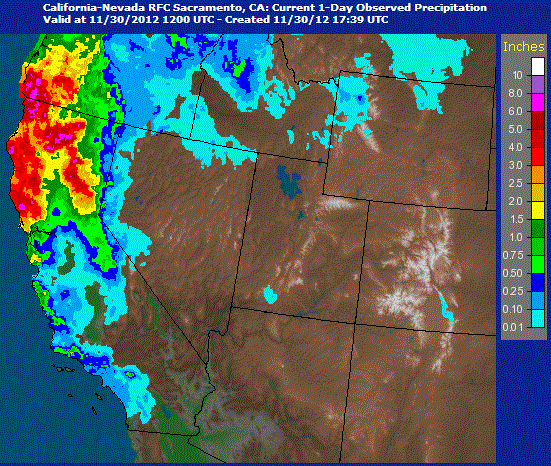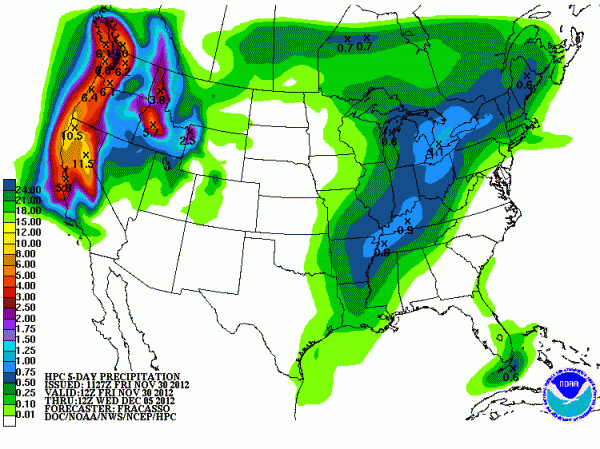For the majority of the United States, the weather has been relatively tranquil. But the U.S. west coast weather has been stormy, as a series of disturbances continues to sweep across portions of California, Oregon, Washington, Nevada, and Idaho.
Rainfall totals have been impressive, with some areas receiving over five inches of rain within the past three or four days. The “atmospheric river” as some meteorologists have termed this event, continues to flow into these regions this weekend to produce even more problems. While high pressure/ridging dominates a large majority of the United States, a flow of storms thanks to a powerful jet stream continues to bring series of disturbances across the west coast.

NOAA and the Hydrometeorological Prediction Center released the latest storm totals across the west coast Friday morning (November 30, 2012). Check out some of these impressive rainfall totals (in inches) across the region that occurred from Tuesday, November 27, 2012 through Friday, November 30, 2012 as of 4:00 AM PST:
California
St. Helena 8.82
Pinecrest 6.86
Orick 5.92
Crescent City/MC Namara Field 5.09
Oregon
OBrien 5.31
Merlin 4.50
Grants Pass 3.30
Cave Junction 3.14
In the higher elevations where the air is much colder at the surface, some areas have received over half a foot of snow. As the series of storm systems sweep into the region through Sunday, some of the higher elevations could experience one to three feet of snow. These snow totals (in inches) will likely continue to grow as this pattern continues throughout the weekend. Here is a list of some of the snow totals across the Northwest:
Charlotte Lake, California 8.0
Chagoopa Plateau, California 7.0
Kaiser Point, California 7.0
Ashland, Oregon 10.0
Not only are the precipitation rates impressive, but so are the wind speeds and gusts across the regions. Many areas have experienced sustained winds of over 30 miles per hour with gusts exceeding 50 mph. Independence, California reported a gust at 79 mph. Meanwhile, in the Mount Rose Ski area in Nevada, observations recorded a 80 mph gust.
Why is it so stormy?

The stormy weather across the Pacific Northwest is occurring thanks to an “atmospheric river” that is set up across the region. The term “atmospheric river” is defined as narrow regions in the atmosphere that are responsible for most of the horizontal transport of water vapor outside of the tropics. These rivers contain the largest amounts of water vapor, the strongest winds, and stall over watersheds vulnerable to flooding which ultimately can create extreme rainfall and floods. This “river” continues to flow into the west coast and it continues to bring a series of strong storm systems that produce heavy rains, accumulating snows, and strong winds.
Check out the rainfall totals for the next five days from the Hydrometeorological Prediction Center (HPC). Flooding will be a huge concern in some areas:

Bottom line: Series of disturbances thanks to an “atmospheric river” continues to hit parts of the west coast of the United States. Rainfall totals will likely exceed 12 inches in some areas, and flooding is a huge concern. Meanwhile, many areas have experienced wind gusts over 50 mph, with some areas experiencing hurricane force wind speeds. The pattern will continue to impact the Pacific Northwest through this weekend (December 1-2, 2012). If you are driving in flooded areas, remember this phrase: Turn around, don’t drown.











